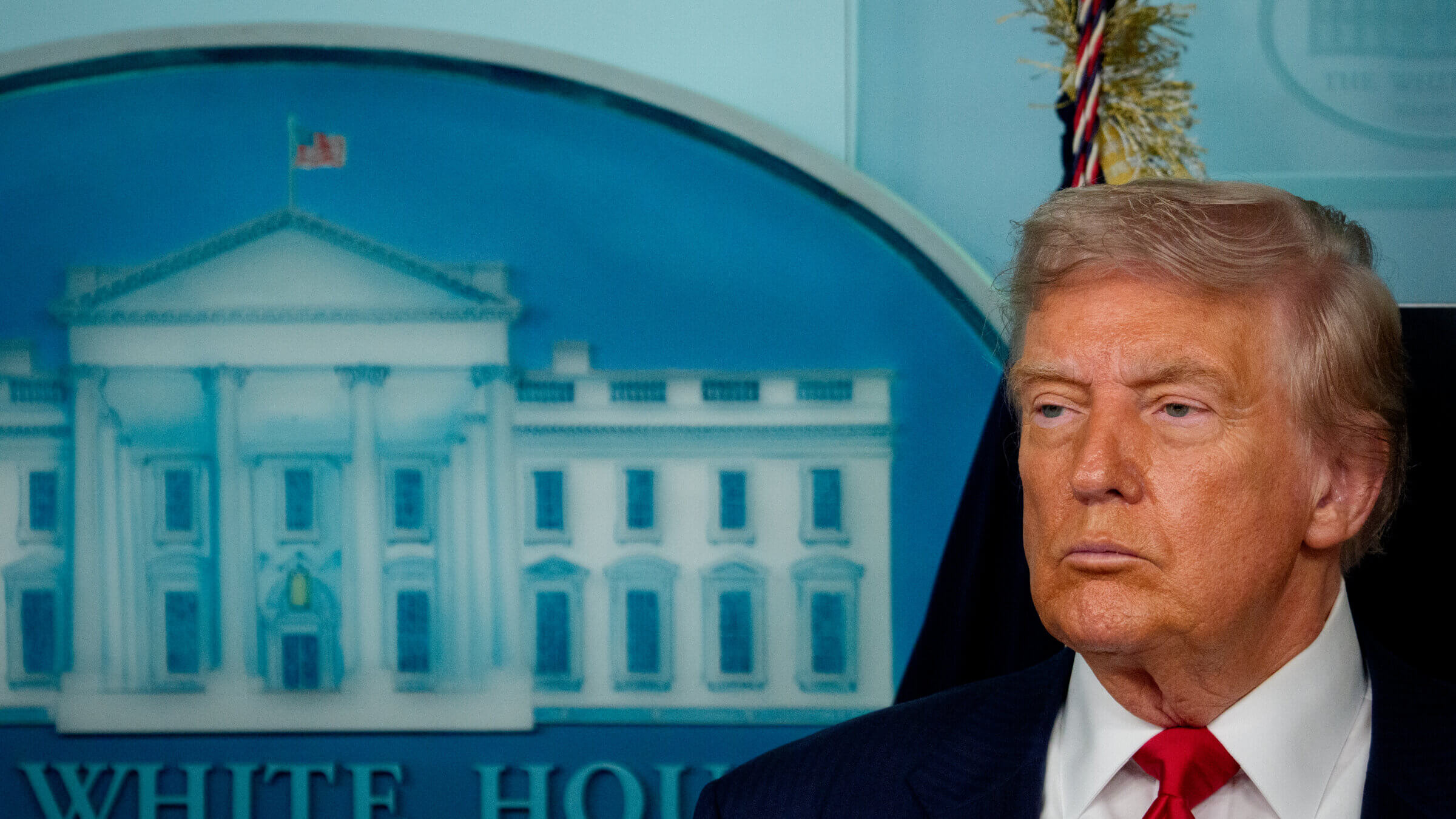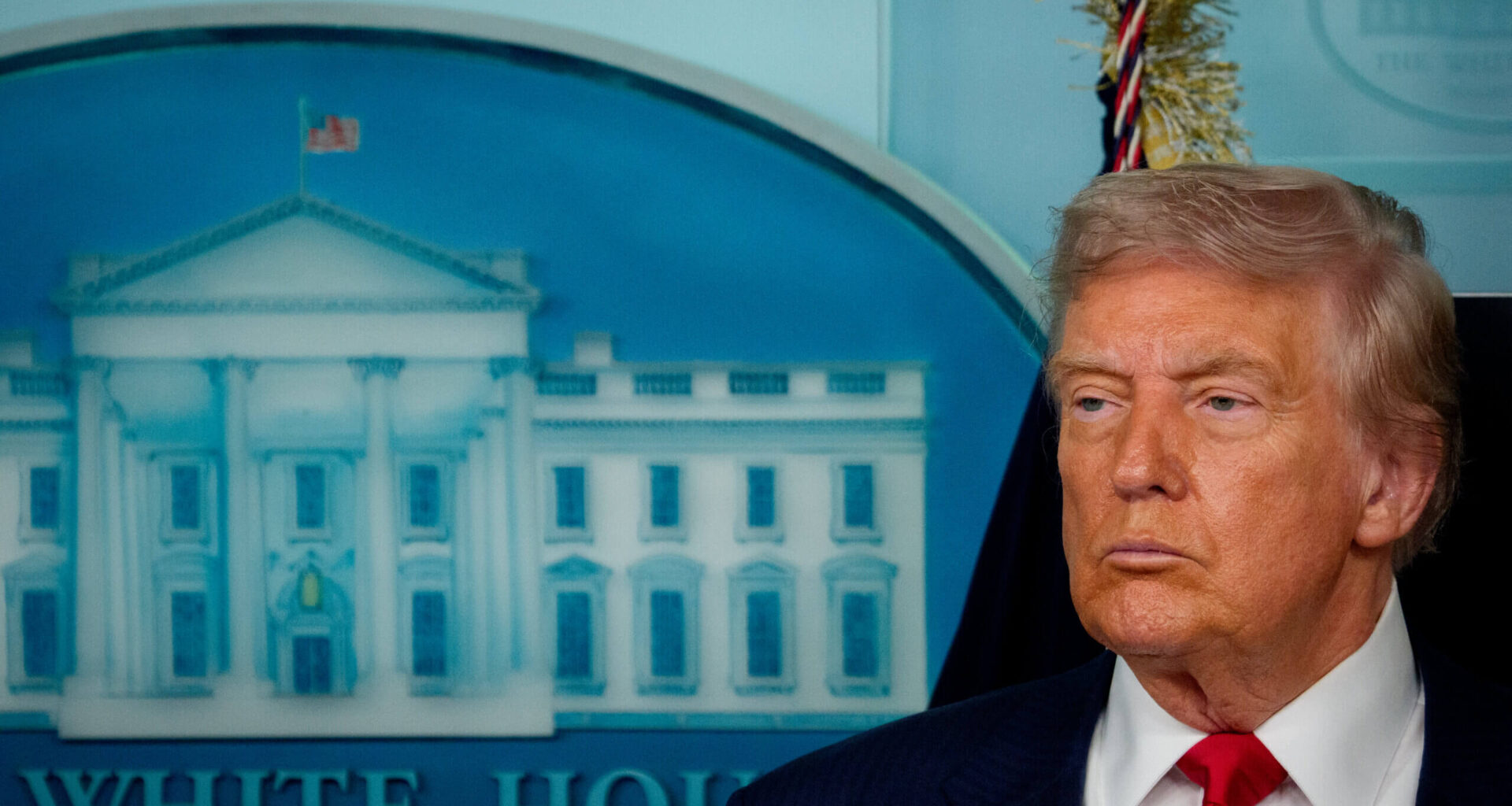
Donald Trump appears during a news conference, Aug. 11, 2025. Photo by Getty Images
August 12, 2025
Eight decades ago, one of the most formidable challenges for postwar Germany was what to do about the millions of Germans who remained die-hard loyalists of Adolf Hitler. With a third of Americans seemingly in hypnotic thrall to Donald Trump, we face a similar reckoning.
If you had asked a middle-aged German in 1950 what they thought of Hitler, you’d likely have heard: “The American occupiers’ denazification policies are making us victims for a second time”; “I didn’t do anything bad during the war”; and “Hitler actually did some good things for the country.”
What if, five years from now, someone asks a die-hard Trump supporter what they think of him? The answer will depend on what happens in America over the next five years. Will democracy prevail over Trump’s autocratic ambitions? If it does, will his supporters regret throwing in their lot with him? If, on the other hand, democracy dies, will they reflect at all on what was lost?

Six months ago, questions like these might have sounded unnecessarily dire. That’s because most Americans didn’t believe Trump would act so quickly and aggressively to dismantle the nation’s democratic pillars — despite the very clear signs, and his own pronouncements, that this was his plan.
So now, here we are. The deep divide separating Americans is a national crisis that goes beyond ideology. The core of the problem is this — a large slice of America believes in making decisions based on proven facts, while another large slice believes whatever Trump tells them, even when he is obviously lying and acting against their own interests.
Are there any signs that we can come together as a country, that sanity can return to politics, and that together we can save democracy? To understand what may lie ahead, it’s worth examining how postwar Germany grappled with its own authoritarian legacy.
Hitler worship did not die with his suicide; it merely receded into the shadows.
The U.S. and its wartime allies had planned to wipe out all vestiges of Nazism and Nazi sympathy in what became West Germany. But war crimes trials, denazification and military occupation didn’t deter nostalgic thoughts about the Third Reich — they fueled resentment, even hatred, toward the occupiers.
The Western powers ultimately caved to Chancellor Konrad Adenauer’s demands: Convicted war criminals received amnesty, denazification was abandoned, and loyal servants of the Third Reich — administrators, cops, attorneys, judges — were allowed to return to government service. In exchange for sweeping the Nazi past under the rug, the Allies won Adenauer’s partnership in the intensifying Cold War.
Lingering Nazism was strongest during the first decade of the new republic. The Holocaust-denying Socialist Reich Party won seats in two state parliaments in 1951 before being banned a year later. While most voters avoided extremist parties, rallies for right-wing war heroes and attacks on synagogues in the late 1950s revealed that nationalist and antisemitic undercurrents still ran deep.
 Leni Riefenstahl in the Olympic stadium in Munich during the 1972 Olympic Games. Photo by Getty Images
Leni Riefenstahl in the Olympic stadium in Munich during the 1972 Olympic Games. Photo by Getty Images
Though the war generation’s silence helped ignite the West German student revolution of the late 1960s, a full reckoning didn’t take hold until after reunification in 1990. Major firms like Siemens, Allianz, Daimler and Volkswagen eventually came clean about their complicity with Hitler and the crimes of the Nazi regime. But it wasn’t until the early 21st century that German government agencies began investigating their postwar hiring of ex-Nazis — a story I explore in my book Nazis at the Watercooler: War Criminals in Postwar German Government Agencies.
During their lifetimes, most of Hitler’s wartime faithful had little reason to fear serious repercussions.
In 1994, I interviewed Leni Riefenstahl, Hitler’s filmmaker, at her chalet in Bavaria. She was 92, but full of energy, preparing for a scuba diving excursion in the Maldives. I asked how she became enamored of Hitler, and what she thought of him now. Her words, delivered with calm detachment, revealed how easily perceived personal suffering could be used to rationalize allegiance to an authoritarian regime.
She recalled reading Mein Kampf and scribbling notes in the margins.
“I liked the aspects of rebuilding Germany,” she said. “I wasn’t the only one. We were really suffering at the time. It was unimaginable. In the antisemitic passages, I wrote, ‘this is wrong.’”
Her words echoed a broader pattern of selective memory and moral evasion — one that may well resurface in America’s future, as Trump loyalists reckon with their own complicity.
We don’t know what America’s destiny will be, but one thing is crystal clear: Trump has no intention of backing off his daily scheming to amass more power and wealth for himself and his progeny. He has already inflicted such damage on American democracy that some political observers and historians now argue the country has entered a form of authoritarianism. Or, as Rachel Maddow put it on MSNBC: “The thing we were all warning about for the last few years is not coming. It is here — we have a consolidating dictatorship in our country.”
,
During the Cold War, Germany’s democratic growth was impeded by the presence of ex-Nazis in government agencies. Fascist remnants influenced policies on the Roma minority, on wartime deserters, on gays and lesbians, and on the left. Legislation drafted by former Third Reich lawyers led to the abandonment of hundreds of cases against Nazi war criminals. Still, those remnants never attempted to overthrow the elected government and restore autocracy.
Just the opposite is happening in the United States under Trump. He has surrounded himself with sycophants. JD Vance, Pam Bondi, Kash Patel, Kristi Noem, Stephen Miller, and the craven GOP members of Congress have become co-conspirators in Trump’s drive to create an authoritarian regime.
Trump’s inner circle may be loyal, but the rest of the country still has a choice. We can demand accountability, defend democratic institutions, and refuse to let authoritarianism become normalized. Postwar Germany teaches us that reckoning delayed is reckoning denied. If we want democracy to survive, we must confront its enemies — not years from now, but today.
Terrence Petty is the author of Nazis At The Watercooler: War Criminals In Postwar German Government Agencies and Enemy Of The People: The Munich Post and the Journalists Who Opposed Hitler.
The views and opinions expressed in this article are the author’s own and do not necessarily reflect those of the Forward. Discover more perspectives in Opinion. To contact Opinion authors, email [email protected].
